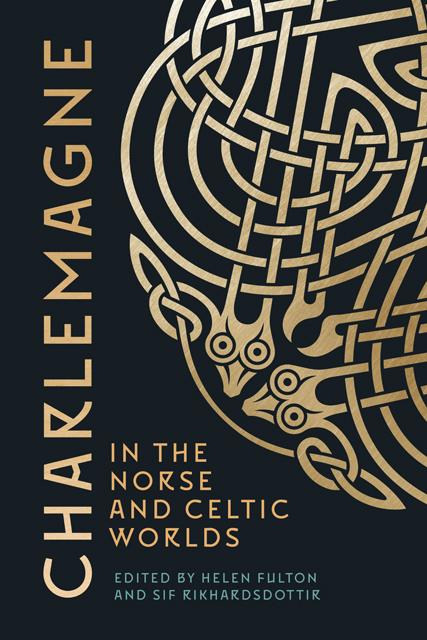Book contents
- Frontmatter
- Contents
- List of Maps and Figures
- List of Contributors
- General Preface: Charlemagne: A European Icon
- Acknowledgements
- Map
- Introduction: Transmission of Charlemagne in Scandinavia, Wales, and Ireland
- Part I The Norse Charlemagne
- Part II The Celtic Charlemagne
- Bibliography
- Index
- Bristol Studies in Medieval Cultures
Introduction: Transmission of Charlemagne in Scandinavia, Wales, and Ireland
Published online by Cambridge University Press: 08 June 2023
- Frontmatter
- Contents
- List of Maps and Figures
- List of Contributors
- General Preface: Charlemagne: A European Icon
- Acknowledgements
- Map
- Introduction: Transmission of Charlemagne in Scandinavia, Wales, and Ireland
- Part I The Norse Charlemagne
- Part II The Celtic Charlemagne
- Bibliography
- Index
- Bristol Studies in Medieval Cultures
Summary
This volume traces the reception and subsequent dissemination of the legend of Charlemagne across several Northern and Celtic-speaking realms in the Middle Ages and beyond. The geographical area spans the margins of the known medieval world in the North and North West and encompasses a broad range of languages and cultures that nevertheless share a common cultural heritage and intersecting pasts. Since 1932, when Hector and Nora Chadwick proposed the idea of a generic pan-European ‘heroic age’ beginning in the Greek classical age and spreading to the Germanic- and Celtic-speaking peoples of early medieval Britain, the Norse and Celtic worlds have been recognised as regions closely connected by geography, politics, and cultural production. Though the Chadwicks’ concept of a widespread unitary ‘heroic age’ characterised by a typology of texts and contexts has its difficulties, their comparative studies of the ‘island literatures’ of Iceland, Britain, and Ireland helped to position these vernacular literatures as a cultural matrix of sea-borne insular traditions.
While the Chadwicks assumed that this shared tradition was largely oral, more recent studies have focused on manuscripts and mobility across the communication pathways linking the north-western islands. Parallels have been found between Norse and Irish saga literature and between Welsh and Old English elegies, while the role of sea links in supporting cross-cultural influence has been at the heart of much scholarship. While earlier studies tended to assume a shared ‘heroic age’ culture, recent scholarship has focused on the transmission and reception of widely known texts in the insular world, including the Trojan legends, the stories of Alexander, and the romances of Chrétien de Troyes.
This is the context, then, in which we came to consider the transmission of the Charlemagne legends in the Norse and Celtic worlds. What is new about our book is its comprehensive account of the Charlemagne legends in Irish, Welsh, and Norse, brought together here for the first time, and our perspectives on textual criticism applied to borrowed texts with several cognates. Moving away from the Chadwickian focus on a singular literary community existing before the Norman conquest, we are interested in literary movements in the same region after the conquest, when vernacular texts began to travel more widely in a number of directions.
- Type
- Chapter
- Information
- Charlemagne in the Norse and Celtic Worlds , pp. 1 - 14Publisher: Boydell & BrewerPrint publication year: 2022



